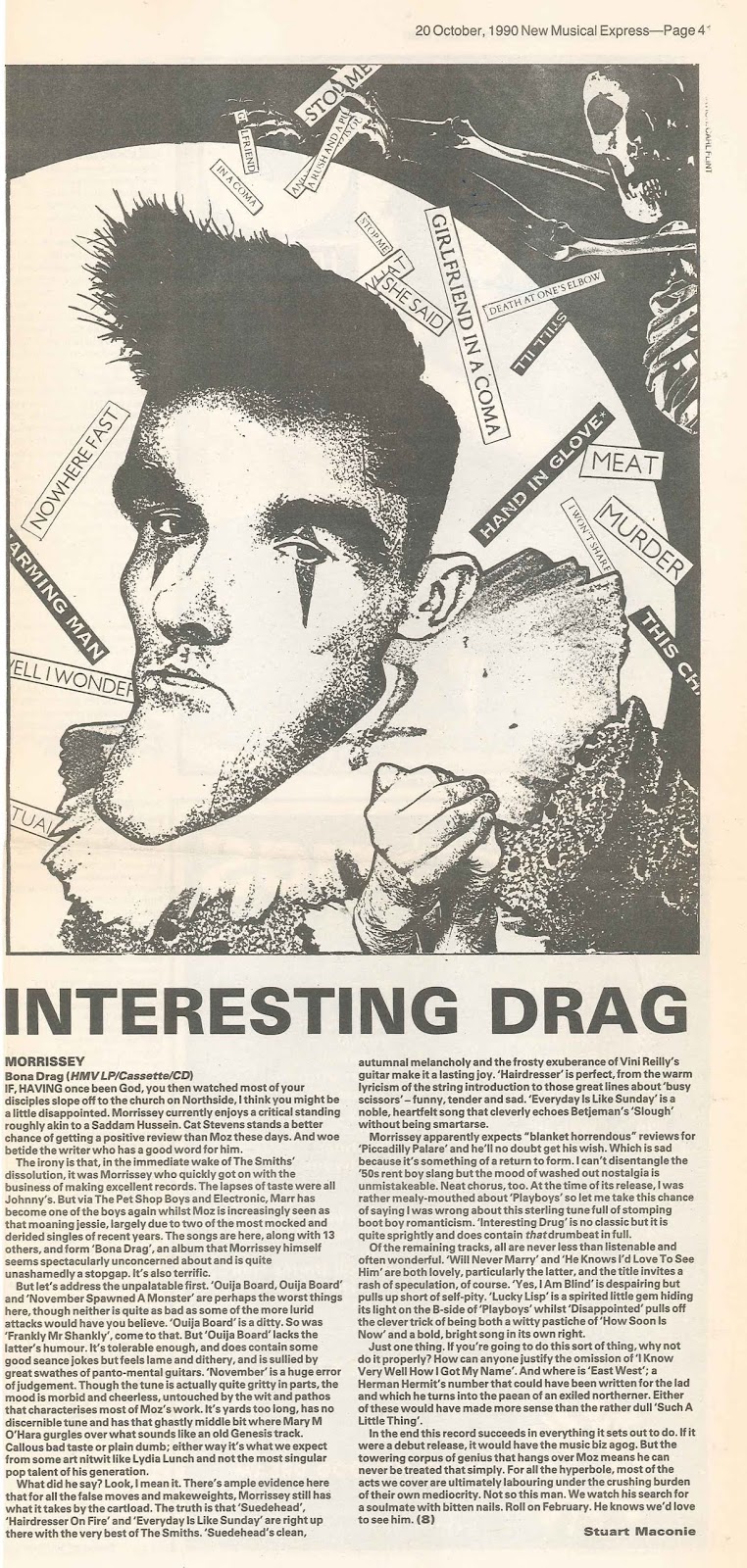1990 10 20 Morrissey "Bona Drag" NME Review
INTERESTING DRAG
MORRISSEY
Bona Drag (HMV LP/Cassette/CD)
IF, HAVING once been God, you then watched most of your disciples slope off to the church on Northside, I think you might be a little disappointed. Morrissey currently enjoys a critical standingroughly akin to a Saddam Hussein. Cat Stevens stands a better chance of getting a positive review than Moz these days. And woe betide the writer who has a good word for him.
The irony is that, in the immediate wake of The Smiths' dissolution, it was Morrissey who quickly got on with the business of making excellent records. The lapses of taste were all Johnny's. But via The Pet Shop Boys and Electronic, Marr has become one of the boys again whilst Moz is increasingly seen as that moaning jessie, largely due to two of the most mocked and derided singles of recent years. The songs are here, along with 13 others, and form 'Bona Drag', an album that Morrissey himself seems spectacularly unconcerned about and is quite unashamedly a stopgap. It's also terrific.
But let's address the unpalatable first. 'Ouija Board, Ouija Board' and 'November Spawned A Monster' are perhaps the worst things here, though neither is quite as bad as some of the more lurid attacks would have you believe. 'Ouija Board' is a ditty. So was 'Frankly Mr Shankly', come to that. But 'Ouija Board' lacks the latter's humour. It's tolerable enough, and does contain some good seance jokes but feels lame and dithery, and is sullied by great swathes of panto-mental guitars. 'November' is a huge error of judgement. Though the tune is actually quite gritty in parts, the mood is morbid and cheerless, untouched by the wit and pathos that characterises most of Moz's work. It's yards too long, has no discernible tune and has that ghastly middle bit where Mary M O'Hara gurgles over what sounds like an old Genesis track. Callous bad taste or plain dumb; either way it's what we expect from some art nitwit like Lydia Lunch and not the most singular pop talent of his generation.
What did he say? Look, I mean it. There's ample evidence here that for all the false moves and makeweights, Morrissey still has what it takes by the cartload. The truth is that 'Suedehead',
'Hairdresser On Fire' and 'Everyday Is Like Sunday' are right up there with the very best of The Smiths. 'Suedehead's clean, autumnal melancholy and the frosty exuberance of Vini Reilly's
guitar make it a lasting joy. 'Hairdresser' is perfect, from the warm lyricism of the string introduction to those great lines about 'busy scissors' - funny, tender and sad. 'Everyday Is Like Sunday' is a
noble, heartfelt song that cleverly echoes Betjeman's 'Slough' without being smartarse.
Morrissey apparently expects "blanket horrendous" reviews for 'Piccadilly Palare' and he'll no doubt get his wish. Which is sad because it's something of a return to form. I can't disentangle the '50s rent boy slang but the mood of washed out nostalgia is unmistakeable. Neat chorus, too. At the time of its release, I was rather mealy-mouthed about 'Playboys' so let me take this chance of saying I was wrong about this sterling tune full of stomping boot boy romanticism. 'Interesting Drug' is no classic but it is quite sprightly and does contain that drumbeat in full.
Of the remaining tracks, all are never less than listenable and often wonderful. 'Will Never Marry' and 'He Knows I'd Love To See Him' are both lovely, particularly the latter, and the title invites a rash of speculation, of course. 'Yes, I Am Blind' is despairing but pulls up short of self-pity. 'Lucky Lisp' is a spirited little gem hiding its light on the B-side of 'Playboys' whilst 'Disappointed' pulls off the clever trick of being both a witty pastiche of 'How Soon Is Now' and a bold, bright song in its own right.
Just one thing. If you're going to do this sort of thing, why not do it properly? How can anyone justify the omission of 'I Know Very Well How I Got My Name'. And where is 'East West'; a Herman Hermit's number that could have been written for the lad and which he turns into the paean of an exiled northerner. Either of these would have made more sense than the rather dull 'Such A Little Thing'.
In the end this record succeeds in everything it sets out to do. If it were a debut release, it would have the music biz agog. But the towering corpus of genius that hangs over Moz means he can never be treated that simply. For all the hyperbole, most of the acts we cover are ultimately labouring under the crushing burden of their own mediocrity. Not so this man. We watch his search for a soulmate with bitten nails. Roll on February. He knows we'd love to see him. (8)
Stuart Maconie

Comments
Post a Comment